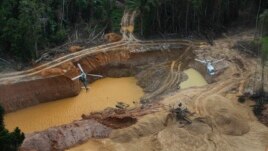10 April 2024
The Yanomami tribe of Brazil is the largest native tribe in the Amazon rainforest.
The group has little contact with the rest of Brazil. But a recent report says that many of the Yanomami have come into contact with the poisonous metal mercury.
Brazil's top public health organization released a report saying the mercury is coming from illegal gold mining. The researchers went to nine villages along the Mucajaí River. It is in an area that is far from major cities and where illegal mining is widespread. In gold mining, mercury is often used to purify gold.

FILE - A Brazil Environmental Agency helicopter flies over an illegal mining camp during an operation to try to contain it in Yanomami Indigenous territory, Roraima state, Brazil, Feb. 11, 2023. (AP Photo/Edmar Barros, File)
The researchers collected hair from nearly 300 Yanomami members of all ages. Medical specialists then examined the hair. Eighty-four percent of the Yanomami tested had been contaminated. The contamination was equal to or above two micrograms per gram. The World Health Organization (WHO) and the U.S. Environmental Protection Agency say such levels can lead to several health problems.
Ten percent of the group had more than six micrograms per gram. That level is linked to severe medical conditions.
Research teams also tested fish in the area. They found high levels of mercury in the fish too. Eating fish with high mercury levels is the most common path to exposure.
Exposure studies usually test for methylmercury. It is a powerful neurotoxin formed when bacteria process mercury. Taking in large amounts over weeks or months damages the nervous system.
The chemical can also pass from a mother to a baby during pregnancy. The U.S. Centers for Disease Control and Prevention says exposure can cause developmental abnormalities in babies.
Health effects include decreased sensitivity in the legs, feet, and hands, overall weakness, and hearing a ringing sound in the ears. In some cases, it can lead to difficulties moving.
The 2013 Minamata Convention is a United Nations-supported agreement signed by 148 parties aiming to reduce mercury pollution. Brazil signed the agreement.
Other scientists have not reviewed the Brazilian government report. But it uses information from three papers recently released in the publication Toxics, all based on the same field work.
One of the studies noted that deciding what problems long-term mercury exposure creates remains difficult.
Maria Elena Crespo López is a scientist at the Federal University of Pará. She was not involved in research. She has studied the subject for 20 years.
She told the Associated Press (AP), "The mercury problem is widespread throughout the Amazon." She said that mercury has been released in the area since the 1970s when gold mining started. She said it ends up being transported over long distances and enters the food system.
The publication Environmental Health Perspectives in 2018 said the Amazon River area communities are one of four areas of most concern.
The WHO lists small-scale gold mining as the largest cause of contamination by humans. The Yanomami territory is an area the size of Portugal and has a population of 27,000. There has been illegal activity in the area for many years.
The AP says the mining problem increased during the four-year term of President Jair Bolsonaro, which ended in 2022. The AP said Bolsonaro limited Brazil's environment protection agencies. This took place during a period when gold prices were increasing. Rising prices could have increased mining activity in Yanomami territory.
Paulo Basta is a scientist with the Oswaldo Cruz Foundation, a scientific group. He led the testing. He said the research took place near the end of Bolsonaro's term. He told the AP that the Mucajaí area had many illegal miners.
During 10 days of testing, 22 researchers were protected by four armed military police. Basta said 30 to 35 small planes flew to and from illegal mining places each day.
He said, "The tension was present throughout our entire stay in the village. I have been working in indigenous villages for 25 years, and it was the most tense work I have done."
Current President Luiz Inácio Lula da Silva has promised to expel gold miners from Yanomami territory and to improve health conditions.
Yanomami leader Dário Kopenawa said in a statement, "Mining is the biggest threat we face in Yanomami land today." Of the mining, he said, "This research provides concrete evidence of it."
I'm Gena Bennett. And I'm Gregory Stachel.
Seth Borenstein reported this story for The Associated Press. Gregory Stachel adapted it for VOA Learning English.
______________________________________________
Words in This Story
contaminate – v. to make (something) dangerous, dirty, or impure by adding something harmful or undesirable to it
exposure – n. the fact or condition of being affected by something or experiencing something
nervous system – n. the system of nerves in your body that sends messages for controlling movement and feeling between the brain and the other parts of the body
small-scale – adj. small in size especially compared to industrial or advanced levels
entire – adj. involving all of something
indigenous –adj. native to or coming from a certain place or geographical area
concrete –adj. something that is sure or strong